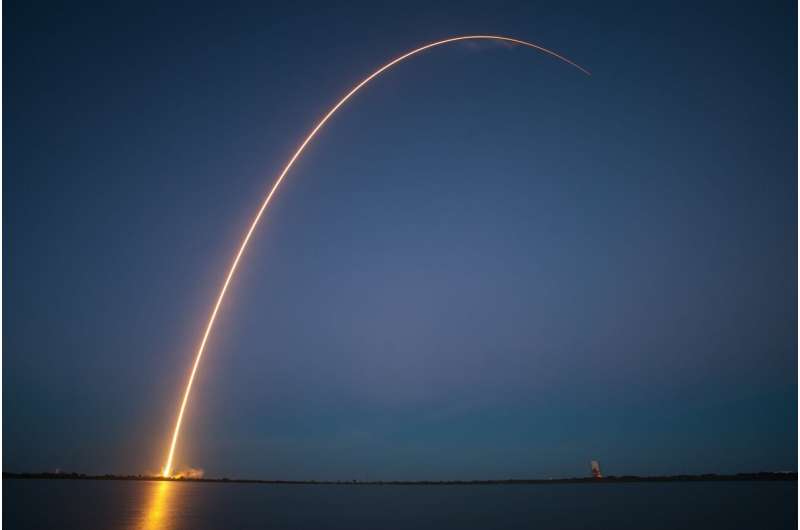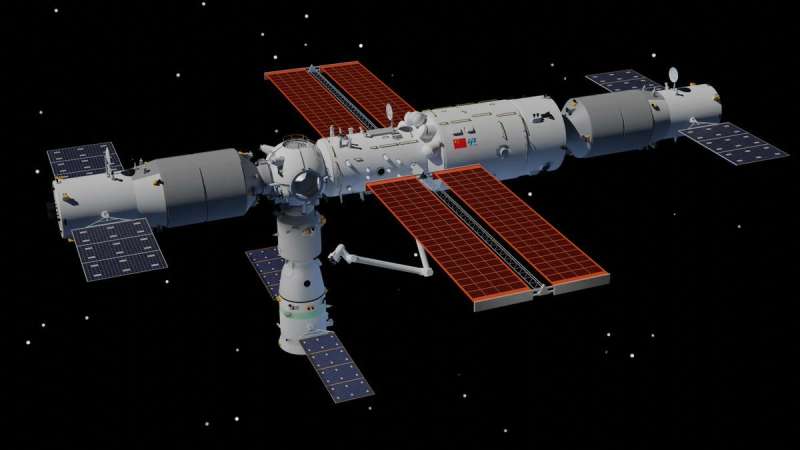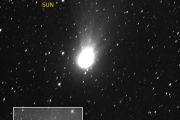
Copernical Team
China's new-generation manned launch vehicle may have reusable first stage: report
 China's new-generation manned launch vehicle may have a reusable first stage that can make a vertical soft landing, Science and Technology Daily reported Friday.
The reusable first stage can perform engine deceleration during the reentry, and control itself and decelerate by pneumatic rudders, said Wang Xiaojun, head of the China Academy of Launch Vehicle Technology, which is under China A
China's new-generation manned launch vehicle may have a reusable first stage that can make a vertical soft landing, Science and Technology Daily reported Friday.
The reusable first stage can perform engine deceleration during the reentry, and control itself and decelerate by pneumatic rudders, said Wang Xiaojun, head of the China Academy of Launch Vehicle Technology, which is under China A How to reach a tumbling target in space
 In 2002, the European Space Agency launched Envisat, the largest civilian satellite (at the time) to go to low Earth orbit (LEO). For a decade, it observed our planet and sent back valuable data on Earth's climate, tracking the decline of Arctic sea ice and more, until it went dark in 2012.
One of the prevailing theories for its demise is that it simply ran out of fuel. As LEO becomes more
In 2002, the European Space Agency launched Envisat, the largest civilian satellite (at the time) to go to low Earth orbit (LEO). For a decade, it observed our planet and sent back valuable data on Earth's climate, tracking the decline of Arctic sea ice and more, until it went dark in 2012.
One of the prevailing theories for its demise is that it simply ran out of fuel. As LEO becomes more NASA Selects Futuristic Space Technology Concepts for Early Study
 An astronaut steps into a body scanner and, hours later, walks on Mars in a custom-made spacesuit, breathing oxygen that was extracted from Mars' carbon dioxide-rich atmosphere. On Venus, an inflatable bird-like drone swoops through the sky, studying the planet's atmosphere and weather patterns. Ideas like these are currently science fiction, but they could one day become reality, thanks to a ne
An astronaut steps into a body scanner and, hours later, walks on Mars in a custom-made spacesuit, breathing oxygen that was extracted from Mars' carbon dioxide-rich atmosphere. On Venus, an inflatable bird-like drone swoops through the sky, studying the planet's atmosphere and weather patterns. Ideas like these are currently science fiction, but they could one day become reality, thanks to a ne Russia halts space launches from French Guiana over sanctions
 Russia is suspending space launches from French Guiana and withdrawing its technical personnel in response to EU sanctions over Moscow's invasion of Ukraine, the space agency said Saturday.
"In response to EU sanctions against our enterprises, Roskosmos is suspending cooperation with European partners over organising space launches from the Kourou cosmodrome and withdrawing its technical per
Russia is suspending space launches from French Guiana and withdrawing its technical personnel in response to EU sanctions over Moscow's invasion of Ukraine, the space agency said Saturday.
"In response to EU sanctions against our enterprises, Roskosmos is suspending cooperation with European partners over organising space launches from the Kourou cosmodrome and withdrawing its technical per Russian invasion of Ukraine and resulting US sanctions threaten future of ISS
 New U.S. sanctions on Russia will encompass Russia's space agency, Roscosmos, according to a speech U.S. President Joe Biden gave on Feb. 24, 2022.
In response to these sanctions, the head of Roscosmos on the same day posted a tweet saying, among other things, "If you block cooperation with us, who will save the ISS from an uncontrolled deorbit and fall into the United States or Europe?"
New U.S. sanctions on Russia will encompass Russia's space agency, Roscosmos, according to a speech U.S. President Joe Biden gave on Feb. 24, 2022.
In response to these sanctions, the head of Roscosmos on the same day posted a tweet saying, among other things, "If you block cooperation with us, who will save the ISS from an uncontrolled deorbit and fall into the United States or Europe?" Russia suspends space launches from French Guiana over sanctions
 Russia is suspending space launches from
French Guiana and withdrawing its technical personnel in response to EU sanctions over Moscow's invasion of Ukraine, the space agency said Saturday.
"In response to EU sanctions against our enterprises, Roskosmos is suspending cooperation with European partners over organizing space launches from the Kourou cosmodrome and withdrawing its technical
Russia is suspending space launches from
French Guiana and withdrawing its technical personnel in response to EU sanctions over Moscow's invasion of Ukraine, the space agency said Saturday.
"In response to EU sanctions against our enterprises, Roskosmos is suspending cooperation with European partners over organizing space launches from the Kourou cosmodrome and withdrawing its technical SpaceX launches batch of Starlink satellites from California

A SpaceX Falcon 9 rocket blasted off from California on Friday and carried 50 more satellites into orbit for the Starlink internet constellation.
A SpaceX webcast showed the rocket's upper stage deploying the satellites a little over an hour after the 9:12 a.m. liftoff from Vandenberg Space Force Base.
The satellites will use their own thrusters to move into their operational orbits over a period of weeks.
The first stage successfully landed on a "droneship" in the Pacific Ocean. It was the fourth successful launch and landing of the reusable booster.
Starlink is a space-based system that SpaceX has been building for years to bring internet access to underserved areas of the world.
Hawthorne, California-based SpaceX has close to 2,000 Starlink satellites orbiting Earth at an altitude of 340 miles (550 kilometers).
Explore further
© 2022 The Associated Press. All rights reserved. This material may not be published, broadcast, rewritten or redistributed without permission.
James Webb Telescope adjustments bring stars more into focus
 NASA announced Friday that it completed another step in its alignment process of the new James Webb Space Telescope, bringing its test images more into focus.
The space agency said it completed the second and third of a seven-phase process to bring the telescope's 18 mirrors into proper alignment. NASA said it will now begin making smaller adjustments to the mirrors to make images even
NASA announced Friday that it completed another step in its alignment process of the new James Webb Space Telescope, bringing its test images more into focus.
The space agency said it completed the second and third of a seven-phase process to bring the telescope's 18 mirrors into proper alignment. NASA said it will now begin making smaller adjustments to the mirrors to make images even US-Russia tensions spill into space, but ISS safe -- for now
 Russia's invasion of Ukraine has placed a question mark over the future of the International Space Station, long a symbol of post Cold War cooperation, where astronauts and cosmonauts proudly live and work side-by-side.
The outpost was the subject of a menacing Twitter thread by Russian space agency head Dmitry Rogozin, who warned Thursday that US sanctions could "destroy our cooperation" an
Russia's invasion of Ukraine has placed a question mark over the future of the International Space Station, long a symbol of post Cold War cooperation, where astronauts and cosmonauts proudly live and work side-by-side.
The outpost was the subject of a menacing Twitter thread by Russian space agency head Dmitry Rogozin, who warned Thursday that US sanctions could "destroy our cooperation" an Here's what China is planning to do in space for the next five years

Central planning is literately central to any communist country, though its history has mixed results. As part of that planning, bureaucrats in all parts of the government are occasionally tasked with coming up with goals and milestones for their specific part of the government. These usually take the form of a five- or 10-year plan, which is what the China National Space Agency (CNSA) released on January 28.
This is the fifth such report, with previous releases in 2000, 2006, 2011 and 2016, and the current plans for future space exploration build on the efforts of the past plans. At more than 7,500 words, the document itself is hefty but still a relatively high-level overview of what the agency hopes to achieve. Some main focal points include improving the sustainability of their rocket launches, improving their global position system, partnering with Russia on lunar exploration, maintaining and expanding the Tiangong space station, researching the underlying technology for a Mars sample return mission, and building a global partnership to build a research station on the moon.
































